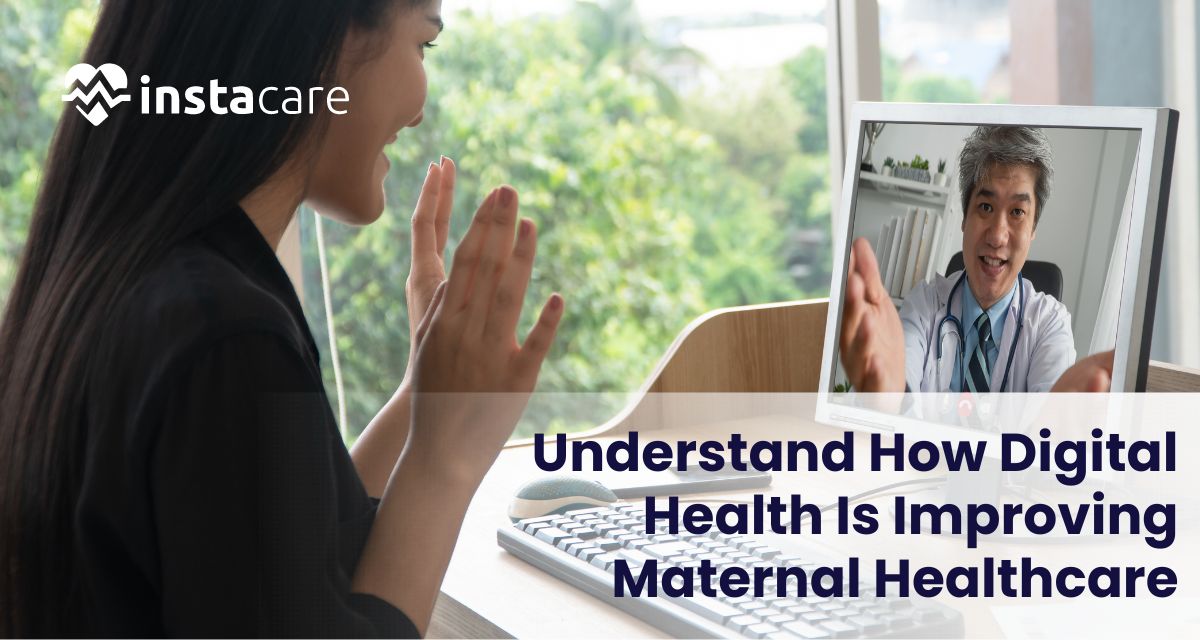Last updated on Thursday, 30, May, 2024
Table of Contents
Understand How Digital Health Improving Maternal Healthcare?
Digital transformation has become a primary and potent instrument in the field of healthcare since it modifies many tumors in medical practice. One key area that has been most impacted by this transition is the area of maternal health. This welcomed change behooves us to remain open to new ideas, new tools, and new strategies in digital health improving maternal healthcare. Now it is time to explore how digital health ensures a positive effect on the quality of life of both mothers and expectant moms.
Empowering Digital Health Improving Maternal Healthcare
digital health improving maternal healthcare, which comes as a result of use of technology, has provided a way through which pregnant women can access health care services easily. It is no longer a dream come true where women have to book as many prior appointments and travel long distances just for the regular prenatal check-up. Today, the patients have opportunities to be on a healthcare provider’s appointment list from their homes for a few clicks.
This is because through virtual consultations, pregnant women can engage with a certified doctor, have a chance to express any issues they feel the need to address or seek clarification on aspects touching on prenatal care services. Not only does this reduce the time and energy spent by individuals in seeking medical care but also guarantees that pregnant women especially these who are in the rural or isolated areas, are able to access adequate health care.
Enhanced Prenatal Monitoring with Wearable Devices
Wearable technology is continuously evolving, and many women now get to monitor various factors regarding their pregnancy conveniently. Wearable devices that are embedded with sensors can therefore continuously record fetal contraction, fetal heart rate, fetal movements all important indicators of the status of the woman and the fetus.
These devices allow pregnant women to frequently check on the condition of their bodies to ensure everything is fine and no compromise on health is made during the period of pregnancy. By monitoring the fluctuating factors like the blood pressure, heartbeat, and movement, the women can realize that there are changes with the regular patterns of their body and can contact a healthcare provider early enough in case they develop complications.
Improving Maternal Education and Awareness Through Mobile Apps
These confirmed, that the mobile applications relating to the maternity became irreplaceable for expectation women helping them with a vast amount of information and sources at the palm of their hands. These apps provide detailed information about pregnancies, labor, and other concerns a woman may have in regard to the pregnancy, all based on the selected criteria.
Whether it is about the right foods to eat and the kinds of exercises pregnant women should undertake, ways through which labor can be managed and tips and tricks on how to nurse a new born, these apps offer a wide area of coverage in beautifying the pregnancy period for expectant women. They also offer features like due date calculators, tracking symptoms, appointment reminders and among other tools aimed at ensuring that women expectant maintain high levels of conveniences while expectant.
Facilitating Remote Maternal Care with Remote Monitoring Systems
digital health improving maternal healthcare have become devices of great help to conventional approaches when it comes to maternal care especially for pregnancy that has been diagnosed to be at risk. Such systems enable health teams to stay connected and follow the condition of pregnant woman from the comfort of their houses and homes or if there is any complication, to attend to it promptly.
Gathering information from the wearable devices, electronic health records, and remote sensors, these systems are useful to obtain the circumstances of the patients. Such a preemptive strategy allows healthcare providers to identify and manage early emerging challenges that may endanger the mother and/or the baby.
Ensuring Continuity of Care Through Electronic Health Records
Integrated EHRs have helped in improving maternal health by enhancing the continuity of care for expectant mothers from clinicians across various fields. Before its introduction, these electronic health records hold a vast amount of information about a patient’s medical history, previous and ongoing treatments by any registered healthcare provider at any one place and at any given time.
EHRs enable integrated care across different care settings and it includes the ability within multiple disciplines to share information and work collectively. Regardless of whether the patient visits an obstetrician, primary care physician, or a specialist, pertinent information from the woman’s electronic health record is available to all of her healthcare providers.
Providing Remote Prenatal Classes and Support Groups
To elaborate the healthcare providers can use online spaces and conduct online meetings with a focus on such matters as childbirth preparation, breastfeeding practices, and care of the newborn.
These classes enable pregnant women to gain lots of knowledge and resources using their computers and mobile phones from the comfort of their homes without having to go for physical classes. Furthermore, clinical and counseling services offer messages and online group support sessions for baby-mothers-to-be and other participants to interact with professionals and other participants. This feeling of community and support can be very help full especially when the woman is going through her pregnancy and feels lonely or stressed out at times.
Remote Monitoring of High-Risk Pregnancies
Apart from implementing regular prenatal check ups, digital health improving maternal healthcare is vital in managing high risk pregnant women through clinics. This means that for women with chronic diseases or pregnancy complications, close observation of fetal growth, maternal status, and other factors that could pose risks is very crucial in order to have a healthy baby and complication-free delivery.
Telemonitoring lets clinicians maintain a lot of vigilance in view of these pregnancies although physical check-ups may not be made numerous times. It assists the healthcare teams through wearable devices, remote sensors, and telemonitoring systems to display the vital signs, perform fetal surveillance, and assess signs of dearth or any complications.
Conclusion
Digital innovation has impacted on the experience of maternal care positively by providing expectant women the ability and means to help monitor their health status from the comfort of their homes; improved prenatal care in terms of remote monitoring; provision of continuity of care; and other potentialities.
While this technology is impressive, the advancement in technology means that there is much more that can be achieved in this area of science. As a result, we can explore a new phase in developing digital health and solve challenges connected with pregnancies, thus positively influencing mothers and future generations.
FAQs
What is telemedicine, and how does the use of technology in the prenatal care delivery system help expectant mothers?
Telemedicine can then be defined as the practice in healthcare delivery that is based on the use of digital technology. As for the pregnant women who cannot leave their homes, telemedicine will help them receive recommendations from doctors, receive primary care, and communicate with their healthcare providers without going through traditional in-person visits.
How do wearable devices assist in prenatal monitoring, and are they safe to use during pregnancy?
Wearable technology with sensors include gadgets that expectant mothers can wear and keep track of body parameters such as the fetus heartrate, movements, and contractions in the womb. These devices are extremely important for understanding the overall health conditions of both the mother and the fetus, and identifying any shifts or deviations from typical patterns.
What types of information and resources are available through mobile apps dedicated to maternal health?
Today there are numerous applications that are exclusively designed to address all the concerns and necessities of soon-to-be mothers. These apps encompass topics to do with pregnancy, labor, feeding, as well as post-delivery hacks on feeding and caring for the new born. In addition, the app may have features like due date calculators, symptom logs, and appointment scheduling alerts to ensure that expectant mothers can always stay informed and ready.
How do those remote monitoring systems enhance the care of women with high-risk pregnancy and what benefit it may be to both mother and newborn?
Telemedicine solutions allow medical doctors to oversee pregnant women, specifically those who are considered to be at risk of experiencing complications, without having to meet with them physically quite often. It gathers data from smart clothing, EHRs, and remote sensors to offer a full, detailed understanding of the patient’s status.



